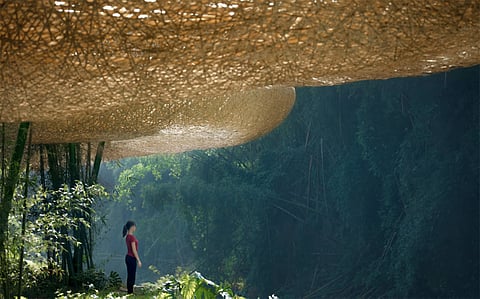
- NEWS
- the EDIT
- COMMENTARY
- BUSINESS
- LIFE
- SHOW
- ACTION
- GLOBAL GOALS
- SNAPS
- DYARYO TIRADA
- MORE

In the quest for sustainable construction materials that help mitigate climate change, bamboo stands out as among the best materials to fit the bill. More than just a beautiful and graceful tree for tropical gardens, bamboo is seeing new light for its industrial purposes as well.
Internationally renowned architects like Renzo Piano, Buckminister Fuller and Frei Otto all have incorporated bamboo in the designs and as materials in their iconic structures. For Renzo Piano, it's the Jean-Mrie Tjibaou Cultural Center on the island of New Caledonia that caught the public's attention. Named after the New Caledonian leader, the sturdy building built in the late 1990s is an homage to the conciliation between the people of New Caledonia and France.
A more recent work is by architecture studio Ibuku, which completed the magnificent The Arc gymnasium for the Green School in Bali. The unique building features a complex double-curved roof made entirely from bamboo. The Arc is the latest structure of the school, which is essentially an agricutural school founded by John and Cynthia Hardy. Their daughter Elora Hardy designed the trailblazing building that wonderfully stands out in the middle of a Bali forest.
Said to be a lightweight structure, the 14-meter high roof covers a spacious, undistracted column-free floor area of 760 meters.
"The concepted structure for The Arc is totally unprecedented," Ibuku project architect Rowland Sauls was quoted in Denzeen.com. "Embarking on a design never before executed required some bravery and optimism. We were creative and stubborn enough to research and develop the answers needed for the success of the project."
Another hulking creation built on bamboo and inspired from its lush mountain environment is from the Chinese architecture studio LLLab. The modern architectural wonder features bamboo woven into a canopy with a collective of pod-like pavilions. The structure itself is used to house guests as they view an amazing Sanjie Liu light show set in the evening and with the dramatic limestone mountain of Guilin as backdrop.
Strips of bamboo were soaked in water to make them pliable. Then skilled artisans wove them loosely in the shape of massive lanterns. An inner layer of protective clear polythene sheeting was added to guard the edifice from rain or falling debris on the bamboo roof.
An artice on Dezeen.com cited LLLab: "As a means to coincide with what is already there, the new architecture looked at borrowing the materiality of the bamboo, reconfiguring it to form new space.
"In doing so, this new space means not to contest. Instead it aims to augment, albeit very gently, the surrounding bamboo groves and hills."
Bamboo builder's workshop
Meanwhile, Base Bahay Foundation, Inc., a pioneering foundation that provides alternative building technologies for comfortable, affordable, resilient,
eco-friendly houses, has announced its continued efforts to provide free online and in-person workshops as part of its continuing professional development Programs under the Base Bamboo Academy.
The Foundation is a global leader in bamboo-based research and technology and its workshops are key to driving its advocacy.
The Base Buhay Academy is accredited by the Professional Regulation Commission to conduct CPD programs for industry professionals and conducts free learning modules for workers and professional builders such as architects and civil engineers since 2021.
In September, the Academy held online and in-person workshops on Bamboo Standards for architects, contractors, civil engineers, and professional builders. Entitled "Bamboo Standards: Guiding Principles and Codes behind the Cement-Bamboo Frame Technology," sessions covered discussions on "PNS ISO 22157: Physical and Mechanical Properties of Bamboo;" "PNS ISO 19624: Grading of Bamboo Culms;" and "PNS ISO 22156: Bamboo Structures."
Contractors will benefit from Base's accreditation program which, when completed, provides access to a series of training programs, research, and more information on the latest technology in bamboo housing and other alternative construction materials. Accredited contractors are also able to engage in construction projects with other Base partner organizations.
For industry workers, the Academy offers TESDA-accredited programs on masonry and carpentry and also covers the basics of employing Base Bahay's signature Cement-Bamboo Frame Technology. Base's skills training programs allow workers to earn their TESDA NC II Certifications which they can use for other projects.
Under its fold, the Academy has trained over 500 civil engineers and architects in its CPD program, and certified more than 100 workers through its TESDA-accredited programs.
Base Bahay continues to work with different organizations engaged in building affordable yet high-quality housing solutions with Base's Cement-Bamboo Frame Technology. To date, over 1,200 have been built with another 500 in the pipeline through ongoing builds.
Currently, Base is working on the inclusion of bamboo in the National Structural Code of the Philippines and is on its way to being published next year, which also makes the topics very timely.
For more information on Base Bahay Foundation and Learning Programs available through the Base Bamboo Academy, visit www.base-builds.com.
